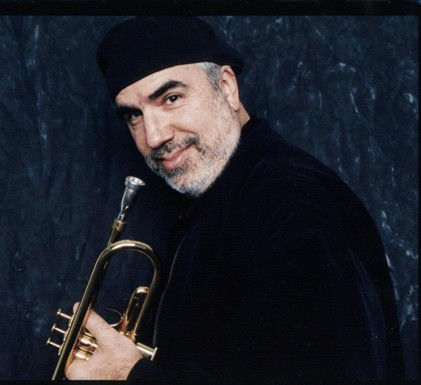
Interview with Joe Montague
 Forty
years after he began his music career, Jazz trumpeter Randy Brecker comes to
life as he talks about the new directions emerging in the genre. Brecker says
that the globalization of Jazz music, "just adds to the spicy mix of Jazz."
He points to bassist Richard Bona from Minta Eastern Cameroon as a perfect
example of someone who has infused a new element into Jazz. "His brand of Jazz
is mixed in with an incredible array of folk influences that you just couldn't
get from somebody who was born in
Forty
years after he began his music career, Jazz trumpeter Randy Brecker comes to
life as he talks about the new directions emerging in the genre. Brecker says
that the globalization of Jazz music, "just adds to the spicy mix of Jazz."
He points to bassist Richard Bona from Minta Eastern Cameroon as a perfect
example of someone who has infused a new element into Jazz. "His brand of Jazz
is mixed in with an incredible array of folk influences that you just couldn't
get from somebody who was born in
Brecker's love for traveling and experiencing new
cultures combined with his heart for playing passionate music, has led him to
many new friendships. "In eastern Europe there are amazing musicians. I play
with a wonderful tenor saxophonist named Igor Butman (Nostalgie, Prophecy)."
Brecker says of the Russian and his countrymen, "They are wonderful,
straight-ahead, completely schooled musicians. They have a history of Russian
folk music that creeps into their styles."
"Country by country, you play with musicians who have
studied the American Jazz tradition, but who also bring their indigenous music
into it. It's just brought a lot of life into the Jazz world which is constantly
evolving. Now we see it spreading all over the world. If we look back at this
time in history, I think that it (international flavor) is bringing Jazz to the
forefront in this time and place," he says.
Jazz music in
Back home in
I asked Brecker to share his thoughts concerning the
emergence of good women instrumentalists in recent years. I got a different
answer than the one I was expecting. "It's not necessarily true; there were just
women that we hadn't heard of. There is a book called Swing Shift: "All Girl
Bands of the 1940s" (Sherrie Tucker-Duke University Press) that features women
(in Jazz) in the thirties and the forties. There were a lot of bands, some
really good. They got some attention mainly in films, but I suppose it was a
novelty. They never played with the men. Just as there was segregation by
race, it was also segregated by gender. Then slowly but surely (women) piano
players started making their mark."
Brecker reflects on the many women who were both
pioneers in Jazz and are some of today's top performers. He mentions the
legendary Mary Lou Williams. "Occasionally there would be an instrumentalist
such as Melba Liston (Dizzy Gillespie's "Cool Breeze") who was so great that she
couldn't be denied. She was a great trombone player. Carlene Ray is a wonderful
bass player who comes to mind. As Brecker continues to champion women Jazz
artists he mentions, "Terri Lynn Carrington is a great drummer. She broke that
whole thing open. I think she suffered a lot of prejudice when she started out
as one of the first females to not only mix with the men, but who is also a
drummer. That was a big hurdle to jump. Now there are many wonderful female Jazz
drummers."
"I just got back from
Talking to Randy Brecker is a lot like walking through a
Jazz museum. He remembers the first time he met and became friends with people
such as George Mraz, Grego Huebner and Miroslav Vitous. David Clayton Thomas'
was the crooner for Blood, Sweat and Tears during the 1960's and Brecker was in
the brass section in 1966. To my surprise, I learned that Brecker had toured
with Stevie Wonder for one year.
Talking to Brecker can be an invigorating experience
because he enthuses about the opportunities presented by new technology such as
the Internet. He sees the bits and bytes transmitted over fiber as a means for
lesser known artists to have their music discovered.
"We were talking about this on the road last week with
the guys I was touring with. There is an entire area (of music) that doesn't
have a name. They (call themselves) jam bands. They are circumventing record
companies by using (the net) to distribute their music. The buzz happens on the
Internet and they sell records at the gigs. I am sure there are some very
nervous record company executives because that whole dynamic is changing."
Brecker's most recent CD Some Skunk Funk
offers up a big band sound and helps the artist realize his life long pursuit of
a dream. "I had wanted to do the big band thing for years because it is
the one thing that I hadn't done," he says. The record features Brecker
performing in a live concert with the WDR Big Band at
Creating Some Skunk Funk was special for Brecker in
other ways as it gave him an opportunity for the first time in years to once
again perform with his brother Michael (tenor sax). They were joined by longtime
friends Peter Erskine (drums), Will Lee (bass) and Jim Beard (keys). The last
track "Song For Barry" features Marcio Doctor in a percussion solo.
Randy Brecker may have been
relaxing at his home in the